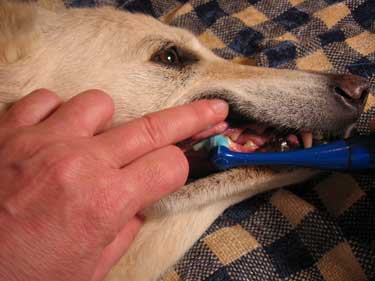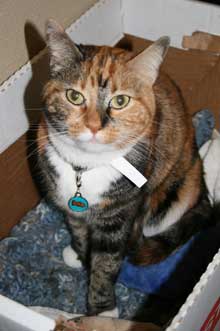
FEBRUARY 22, 2012
Dental hygiene for dogs
An ounce of prevention may be worth a pound of cure, but when it comes to Spot or Fluffy's health; practicing good dental hygiene may make a ton of difference.
 “In fact, an animal's teeth may be more important to its overall health than most pet owners realize,” says Dr. J.R. "Bert" Dodd, clinical associate professor at the Texas A&M College of Veterinary Medicine & Biomedical Sciences.
“In fact, an animal's teeth may be more important to its overall health than most pet owners realize,” says Dr. J.R. "Bert" Dodd, clinical associate professor at the Texas A&M College of Veterinary Medicine & Biomedical Sciences.
"Human dentists have done a really good job of educating people on practicing good preventive dental health, but often we do not think about preventive dental health for our pets," says Dodd.
Overall, dental health can be an indicator of current or future health challenges for humans and pets.
"As goes the mouth, so goes the health. Taking care of your pet's mouth and keeping it nice and healthy should help the animal live longer," Dodd said. Preventive dental care includes regularly brushing your pet's teeth and getting an oral evaluation and dental cleaning at least annually by your veterinarian.
Some pet owners may question the importance of dental health maintenance for pets based on their own experience with childhood pets, but veterinary medicine has come a long way over the past 20 years.
"It used to be that most of our pets died at younger ages, so periodontal disease did not have a chance to impact their health and cause damage to their kidneys, livers or other vital organs. Veterinary medicine has advanced such that we are now better able to treat these diseases and our animals are living longer, healthier lives," explains Dodd.
Dental therapy for pets includes many of the same procedures that help humans maintain healthy teeth, gums, and mouths. Available treatments include oral surgery, periodontics, endodontics, restorations, and even orthodontics on furry patients as needed. Some of these procedures may be offered by your family veterinarian or you may be referred to a board certified veterinary dentist.
Dodd says it is important that pet owners become aware of the serious consequences of ignoring a pet's dental health.
"Periodontal disease is a disease of neglect. If preventative dental health is not practiced and periodontal therapy is ignored, other health complications may follow," says Dodd.
Teeth, gum, or mouth problems can cause infections and disease, or they can be symptoms of serious illness in veterinary patients.
"The teeth are 42 little patients in a dog's mouth, so they need to be well taken care of and treated with respect," says Dodd.
“It is best to begin home care when your puppy or kitten is between 8 and 12 weeks old; however, it is never too late to start,” notes Dodd. “The first step is to train your pet to accept brushing of the teeth and the best way to approach that is to establish a routine of brushing your pet’s teeth with gauze around your finger. It may be helpful to use beef or chicken broth with dogs or tuna water with cats to get them accustomed to the routine instead of using cleaning agents.”
Once a pet is familiar with the daily routine, you can switch out the gauze for a finger brush or a very soft toothbrush. Then you can incorporate using pet toothpaste. Do not use toothpaste intended for people because the ingredients can cause stomach issues in your pet if ingested.
Between the age of 4 months and 7 months all of the “baby” teeth should fall out and be replaced with adult teeth. It is important to monitor this process and make sure that the “baby” teeth do in fact fall out and not stay in the mouth when the adult teeth erupt. These persistent teeth can lead to malocclusion and severe periodontal disease due to crowding and rotating of the erupting teeth. Prompt veterinary attention (extractions) can help prevent these problems.
Contrary to some beliefs, it is important not to give pets bones from leftover food to chew on. In addition to gastrointestinal issues, bones can cause teeth to break which leads to additional visits to the veterinarian and further medical problems.
More and more pet owners are recognizing the connection between healthy teeth and their animal's overall wellbeing, Dodd believes. When you make a dental appointment for yourself, it might be a good idea to make a veterinary appointment to have Spot and Fluffy's teeth cleaned and checked also. An ounce of dental prevention could lead to a longer, healthier life for you and your pet.
Pet Talk is a service of the College of Veterinary Medicine & Biomedical Sciences, Texas A&M University. Visit vetmed.tamu.edu/pet-talk.



 Dazzle is a beautiful calico cat with a playful spirit that loves to be around people. She will sit on your lap but prefers to show affection by rubbing up against you. Dazzle was brought to the Humane Society because her owner moved out of state and could not take her along. Although she can coexist with other
Dazzle is a beautiful calico cat with a playful spirit that loves to be around people. She will sit on your lap but prefers to show affection by rubbing up against you. Dazzle was brought to the Humane Society because her owner moved out of state and could not take her along. Although she can coexist with other